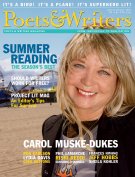Herbert Leibowitz founded Parnassus: Poetry in Review along with Stanley Lewis in 1973. Three years later, Leibowitz established the nonprofit organization Poetry in Review—in order to sustain publication of the magazine—and was named both publisher and editor of the journal that over the past thirty years has become one of the country's most important and provocative venues for poetry reviews. But this fall, Leibowitz will release the last issue of Parnassus. "Funding has become an insuperable obstacle," he says. "I love editing, but the good fairies did not give me any entrepreneurial gifts at birth." The final, six-hundred-page, thirtieth-anniversary issue, forthcoming in September, is dedicated to international poetry.

In 1995, Leibowitz received the PEN American Center's Nora Magid Award for distinguished editing of a literary magazine; in 2002, he received the Elizabeth Kray Award for service to poetry from Poets House. He is the author of two books, Hart Crane: An Introduction to the Poetry (Columbia University Press, 1968) and Fabricating Lives: Explorations in American Autobiography (Knopf, 1989). He is currently finishing a critical biography of William Carlos Williams.
After three decades of publishing Parnassus, Leibowitz spoke about the future of poetry and the challenge of offering an alternative to the "jargon-riddled academic criticism" that has been the dominant voice of the last twenty-five years.
What do you think about the future of poetry and criticism?
Who can prophesy what the future of poetry will be, except to say that there will always be innovators—those who react with great imagination and force against the prevailing taste. Given the fractious world of American poetry, where there is no consensus that Poet A represents the genius of the American language, I can't help thinking things will change in ways my crystal ball doesn't show. When I first started Parnassus thirty years ago, there were not many books of poems by women or minorities published. All of this changed for the good. Now, there are probably more women poets published than there are male poets. Women and minorities had to fight every inch of the way for recognition. Time sifts the really good grain from the chaff. I won't be around to see whether my own hunches win out. Great poets do not arrive on the scene every five years. Whitman came out of nowhere and so did Dickinson. With globalization, American poets are much more aware, or should be, of an inventive Iraqi, a French or Senegalese poet, or a bard in Ecuador.
The future of criticism is even harder to determine. The New Criticism that I was brought up on is not an anachronism because it taught us how to read poems closely. Popular culture has made tremendous inroads into the language of poetry and criticism. Will it last or alter our ideas about what constitutes excellence? I can't say.
Shutting down Parnassus will affect many people—it's a one-of-a-kind publication.
Yes, it has an excellent reputation, but it's hardly been a box office success. Poetry rarely pays dividends, except to the spirit. We will have published close to forty-five or fifty issues. I believe a poet in the twenty-second century will be glad to read Parnassus on Mars or under the ocean.
What's next for you?
Thirty years is a long time to be editing. I will miss it. I am sure I will go through a period of mourning when Parnassus shuts down. But, when I finish my Williams biography, I won't become idle. I have plenty of essays I would like to write. Perhaps I can publish a book of my correspondence with poets. Such a book would show what made Parnassus tick, and what the life of an editor is like. Editors are not indentured servants without privileges.
Polly Giantonio is a poet and freelance writer. She is pursuing her MFA at Western Connecticut State University.








